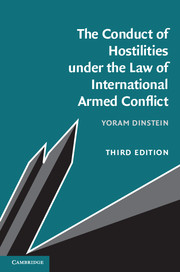Book contents
- Frontmatter
- Contents
- Introduction to the Third Edition
- Preface
- Table of cases
- Table of treaties
- List of abbreviations
- 1 The general framework
- 2 Lawful combatancy
- 3 Prohibited weapons
- 4 Lawful targets of attack
- 5 Protection from attack of civilians and civilian objects
- 6 Measures of special protection from attack
- 7 Protection of the environment
- 8 Specific methods of warfare
- 9 War crimes, orders, command responsibility and defences
- General conclusions
- Index of persons
- Index of subjects
8 - Specific methods of warfare
Published online by Cambridge University Press: 05 April 2016
- Frontmatter
- Contents
- Introduction to the Third Edition
- Preface
- Table of cases
- Table of treaties
- List of abbreviations
- 1 The general framework
- 2 Lawful combatancy
- 3 Prohibited weapons
- 4 Lawful targets of attack
- 5 Protection from attack of civilians and civilian objects
- 6 Measures of special protection from attack
- 7 Protection of the environment
- 8 Specific methods of warfare
- 9 War crimes, orders, command responsibility and defences
- General conclusions
- Index of persons
- Index of subjects
Summary
Starvation of civilians
General
681. Article 54 of AP/I proclaims:
1. Starvation of civilians as a method of warfare is prohibited.
2. It is prohibited to attack, destroy, remove or render useless objects indispensable to the survival of the civilian population, such as foodstuffs, agricultural areas for the production of foodstuffs, crops, livestock, drinking water installations and supplies and irrigation works, for the specific purpose of denying them for their sustenance value to the civilian population or to the adverse Party, whatever the motive, whether in order to starve out civilians, to cause them to move away, or for any other motive.
3. The prohibitions in paragraph 2 shall not apply to such of the objects covered by it as are used by an adverse Party:
(a) as sustenance solely for the members of its armed forces; or
(b) if not as sustenance, then in direct support of military action, provided, however, that in no event shall actions against these objects be taken which may be expected to leave the civilian population with such inadequate food or water as to cause its starvation or force its movement.
682. The Eritrea-Ethiopia Claims Commission determined that ‘the provisions of Article 54 that prohibit attack against drinking water installations and supplies that are indispensable to the survival of the civilian population for the specific purpose of denying them for their sustenance value to the adverse Party had become part of customary international humanitarian law by 1999’ (the critical date for the proceedings). Surely, customary law covers also attacks against foodstuffs and other objects or livestock indispensable to the survival of the civilian population. The list of protected objects enumerated in Article 54 is ‘merely illustrative’, and it may include clothing and means of shelter (tents, blankets, etc.) vital to civilian survival.
683. The expression ‘rendering useless’, which includes polluting, ‘refers mainly to irrigation works and installations’. Drinking water installations encompass water reservoirs, wells and pumps. But it has been argued that the protection extends to ‘electricity-generating plants that supply the power necessary for the purification and pumping of drinking water’ (without which the drinking water installations cannot function).
- Type
- Chapter
- Information
- Publisher: Cambridge University PressPrint publication year: 2016



